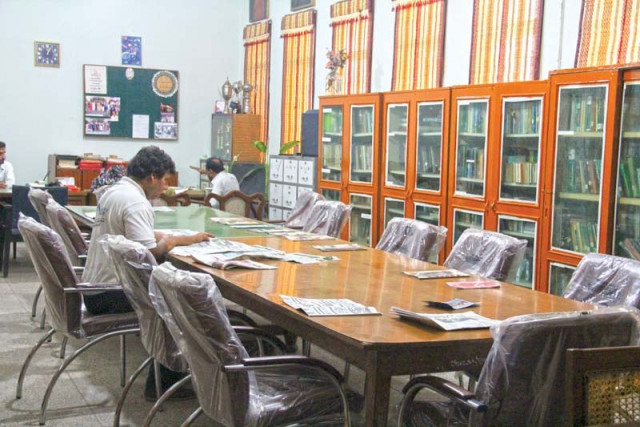PTV’s Karachi library, stuck in yesteryear
Library has not been updated in years, with many obsolete scripts, books despite adequate funding

According to the head librarian, the library receives an annual Rs30,000 for books but, with no new books on its shelves and the funds remaining unutilised, the library bears a very forlorn look. PHOTOS: AYESHA MIR/EXPRESS
An entry from November 5, 1967 records Tariq Aziz as the producer of a drama serial, 'Aaks aur Aina'. The play was written by Saleem Ahmed. In the accession book numerous others are mentioned; writers such as Ghulam Abbas, Ashfaq Ahmed and Haseena Moin and musical genius Sohail Rana for the musical programme 'Sang Sang Chaltay Rehna'.
The library consists of many old books and holds within its folds hundreds of scripts from PTV's heyday. The premise, which has a seating capacity for a mere 15 people, bears a forlorn look, with one or two staff members present. The proverbs 'ignorance is bliss' and a 'little knowledge is a dangerous thing' hold true for the library, as it is often abandoned, with only one or two occupants sitting in the plastic coated chairs.

The library houses numerous encyclopedia editions, regional books on Pakistan's provinces, children's books, reference books on Shah Bhittai, collections of poetry, atlases and much more. It is also home to thousands of scripts, all kept in ratty cardboard boxes.
Visiting the library and reading a newspaper is Ghulam Haider Mangi, an engineer who works at the station's Studio D. He said he can be spotted here every day. Mangi, who has worked at PTV since 1985, said he is very interested in history and Sindhi literature. However, he sorrowfully noted that, "No new books are available on these subjects in this small room". "My daily visits include browsing through the newspapers like Jang and Kavish and taking a quick look at the columns in other newspapers," he said.
The Karachi station housing as many as 400 employees and 20 employees are regular visitors to the library, said an assistant public relations officer at PTV. However, there was little evidence to support this assertion.
Head librarian Deedar Ali Sandeelo was late to visit the library, citing a host of reasons, including 'personal reasons'. He claimed employees visit the library and are very interested in reading. "People here read. The ratio is certainly not less [than other places]. This place is not a public facility, it is only meant for the employees of PTV," he said.
"Often producers visit this section to grab a reference or two for an upcoming play or documentary," added Sandeelo.

But as to how far these old, out-dated books can help young producers, Sandeelo says, "There are no new lists, no new books required as of now. Though the funds are very much there, we don't have space to keep the new books in this little space."
The library receives Rs100,000 annually from the federal government for maintenance purposes, according to Sandeelo. It receives an annual Rs30,000 for books but with no new books on its shelves and the funds remain unutilised, the library bears a very forlorn look. According to him, the books in the library were last updated between 2013 and 2014 and the unused funds are returned to the federal government at the end of the fiscal year.
How can the state's public television channel, which educates millions across the country, particularly in rural areas, progress with an obsolete library within its fold.
Published in The Express Tribune, July 15th, 2016.



















COMMENTS
Comments are moderated and generally will be posted if they are on-topic and not abusive.
For more information, please see our Comments FAQ